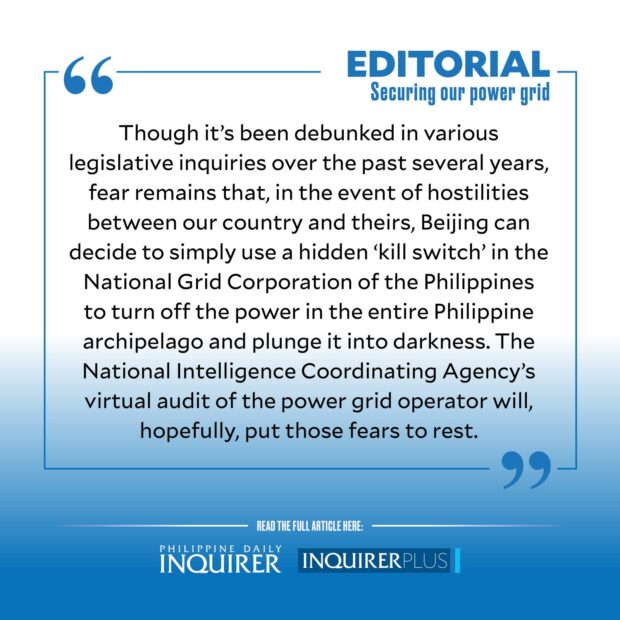Securing our power grid
 China’s involvement in many levels of Philippine society is a reality that our policymakers have to contend with amid elevated geopolitical tensions caused by the rising superpower’s continued illegal occupation of territories within our exclusive economic zone.
China’s involvement in many levels of Philippine society is a reality that our policymakers have to contend with amid elevated geopolitical tensions caused by the rising superpower’s continued illegal occupation of territories within our exclusive economic zone.
China is a major seller of intermediate and finished goods to the Philippines, while vice versa, our country is a major exporter of raw materials to the world’s second-largest economy.
Total bilateral trade between both nations reached $50 billion in 2019, with about two-thirds of this value coming in our direction from China, while the remaining one-third composed of Filipino goods is headed in the other direction.
Asia’s largest nation is also a key investor in our local economy, with many Chinese firms doing business in the Philippines, from the highest corporate levels to the smallest entrepreneurial ones. As the world’s manufacturing hub and industrial powerhouse, it is inevitable that China is deeply embedded and deeply influential in our local society.
This symbiosis is a legitimate cause of concern for our national leaders, who must continually grapple with the challenge of preserving the economic value of our relationship with our giant neighbor on the Asian mainland while protecting our national interests in the face of its aggressive moves in Philippine maritime territory.
It is in this context that a memorandum of understanding (MOU) signed between the National Grid Corporation of the Philippines (NGCP) and the government’s top spy agency, the National Intelligence Coordinating Agency (Nica), to protect the country’s energy infrastructure against cyberattacks—sealed in the presence of President Marcos Jr.—is an important step in asserting the country’s sovereignty.
As the sole operator of the country’s power grid, the importance of the service provided by the NGCP cannot be overstressed. And securing this critical system becomes even more important given the fact that the company is 40 percent owned by the Chinese government through the State Grid Corporation of China, the world’s third-largest company in terms of revenues.
Though it’s been debunked in various legislative inquiries over the past several years, fear remains that, in the event of hostilities between our country and theirs, Beijing can decide to simply use a hidden “kill switch” in the NGCP to turn off the power in the entire Philippine archipelago and plunge it into darkness.
Nica’s virtual audit of the power grid operator will, hopefully, put those fears to rest.
The President said as much in a speech at the signing of the MOU: “There have been fears that the involvement of any foreign entity in our power transmission system would present a security threat to the Philippines. Well, this is a very good step towards answering that challenge.’’
Mr. Marcos aid the Filipino people “can rest assured that their territory, their data, their personal information will not be used against us.’’
Beyond this, a broader audit is needed of China’s penetration of Philippine society to protect us from harm in the event the current cold war in the South China Sea turns into a hot one. The situation calls for setting up safeguards in areas of Philippine society that are exposed to Chinese elements, including the telecommunications and information technology sectors, which equipment and suppliers from mainland China dominate.
As for NGCP itself, people pushing to renationalizing the firm must remember that the power grid was privatized in 2007 for good reason: The Philippine government was saddled with billions of pesos in debt, no thanks to decades of subsidizing the inefficient power sector in a bid to keep electricity prices low. That futile effort almost bankrupted the national treasury.
To remedy this, the government passed legislation to separate the assets from the liabilities, and sell off the former to pay for the latter. The power grid was auctioned off—fairly and squarely—eventually resulting in the current ownership structure that includes China’s State Grid Corp. among the legitimate winning bidders.
Over the last decade and a half, NGCP has invested close to P300 billion in improving the Philippines’ power grid, resulting in less power outages and more efficient delivery of electricity.
Add to that the original $3.95 billion selling price for the power grid in 2007, and increase that amount annually to its present value a decade and a half later, then one can get a better idea of the true cost of this plan for the government to retake NGCP from its current owners—somewhere between P500 billion and P1 trillion.
Does the Philippine government have that money to buy this key power asset back from its private owners? Even the proposed Maharlika Investment Fund will be grossly inadequate for this undertaking. So where will we get this amount?
The only option left then is to let the NGCP be, support it to provide better service, and secure the grid from any internal or external attacks. The Nica-NGCP agreement, if done correctly, will hopefully do just that.




















